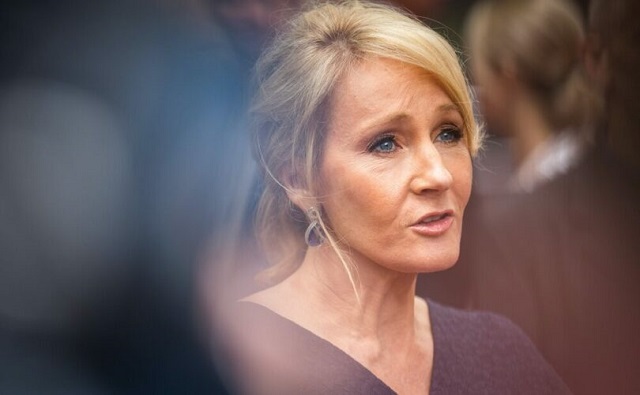Alberta
JK Rowling defends Central Alberta politician against LGBT activist: ‘Bully’

From LifeSiteNews
J.K. Rowling stated, ‘It never seems to occur to them that there’s no bigger indicator of not being a woman than trying to bully people into agreeing you’re a woman.’
Famed U.K.-based author J.K. Rowling recently got involved in local Canadian politics, defending a conservative politician in Alberta for refusing to bend to the demands of an LGBT activist.
The incident concerns Alberta Member of the Legislative Assembly (MLA) Jennifer Johnson. In the lead-up to the 2023 election, she was a member of the ruling United Conservative Party (UCP) but was kicked out of the party by Premier Danielle Smith after audio surfaced of her comparing transgender ideology in schools to adding feces to baked goods.
Despite being kicked out of the UCP, Johnson won her seat by a wide margin running as an independent.

Lacombe-Ponoka MLA Jennifer Johnson
On Tuesday, a video began to circulate on X showing an exchange between Johnson and biological male “Victoria Bucholtz,” who goes by the stage name “Karla Marx.”
Because of her past comments, Johnson recently agreed to meet with LGBT groups from her local community, via video conference, who wanted to speak with her about their “concerns.”
In the video, Bucholtz asked Johnson directly, “Will you state on the record right now ‘trans women are women?’”
In reply, Johnson said, “No, I want to have some time to think on that.”
The incident drew the attention of Rowling, who posted a link of the video observing, “You don’t even need to turn up the sound.”
Honestly, you don't even need to turn up the sound. https://t.co/IwgYPfnZ8o
— J.K. Rowling (@jk_rowling) September 17, 2024
“It never seems to occur to them that there’s no bigger indicator of not being a woman than trying to bully people into agreeing you’re a woman,” she wrote in another post.
Rowling observed that what Bucholtz, in speaking with Johnson, is doing, is the “equivalent of beginning a conversation on climate change with ‘unless you agree the earth is flat, I’m leaving.’”
Danielle Smith not behind meeting with Johnson and activist 
LifeSiteNews was given information from a well-connected member of the UCP, who asked to not be named, that many MLAs in the party support Johnson and want her back in the party.
While Premier Danielle Smith has not yet let Johnson back into the UCP, she is reportedly warming up to the idea.
Johnson made it clear that contrary to rumors, it was not Smith who ordered her to attend the meeting with Bucholtz.
In a statement on Facebook Wednesday, Johnson said she needed to set things straight regarding her meeting with the pro-LGBT groups.
“This statement addresses the meeting between me, Jennifer Johnson, the Independent MLA for Lacombe-Ponoka, and the Lacombe Pride Society, Ponoka Pride Society, Central Alberta Pride Society, and multiple others. These societies requested a meeting with me, and I was happy to meet with them and hear their concerns as my constituents. I looked forward to a respectful and informative meeting with them,” she wrote.
Johnson said that the meeting was at the request and arranged by a “constituent of the Lacombe-Ponoka riding, and I was happy to accept their invitation to meet.”
“Danielle Smith, her office, and the UCP caucus and party were in no way involved in or aware of this meeting and, contrary to speculation, this meeting has nothing to do with my future as an Independent Member of the Legislature.”
Johnson said that she “supports” the work of Smith and her UCP government and looks “forward to working with all Members of the Legislature in the fall session on the Parental Rights legislation and other important bills.”
Rowling in recent years had to be on the defensive for saying gender-confused men who claim to be a woman are in fact men.
Earlier this year, Smith announced strong pro-family legislation that strengthens parental rights, protects kids from life-altering so-called “top and bottom” surgeries, as well as other extreme forms of transgender ideology.
Despite these steps, Smith still holds views at odds with social conservatives, telling Jordan Peterson that conservatives must embrace homosexual “couples” as “nuclear families.”
Alberta
Gondek’s exit as mayor marks a turning point for Calgary

This article supplied by Troy Media.
The mayor’s controversial term is over, but a divided conservative base may struggle to take the city in a new direction
Calgary’s mayoral election went to a recount. Independent candidate Jeromy Farkas won with 91,112 votes (26.1 per cent). Communities First candidate Sonya Sharp was a very close second with 90,496 votes (26 per cent) and controversial incumbent mayor Jyoti Gondek finished third with 71,502 votes (20.5 per cent).
Gondek’s embarrassing tenure as mayor is finally over.
Gondek’s list of political and economic failures in just a single four-year term could easily fill a few book chapters—and most likely will at some point. She declared a climate emergency on her first day as Calgary’s mayor that virtually no one in the city asked for. She supported a four per cent tax increase during the COVID-19 pandemic, when many individuals and families were struggling to make ends meet. She snubbed the Dec. 2023 menorah lighting during Hanukkah because speakers were going to voice support for Israel a mere two months after the country was attacked by the bloodthirsty terrorist organization Hamas. The
Calgary Party even accused her last month of spending over $112,000 in taxpayers’ money for an “image makeover and brand redevelopment” that could have benefited her re-election campaign.
How did Gondek get elected mayor of Calgary with 176,344 votes in 2021, which is over 45 per cent of the electorate?
“Calgary may be a historically right-of-centre city,” I wrote in a recent National Post column, “but it’s experienced some unusual voting behaviour when it comes to mayoral elections. Its last three mayors, Dave Bronconnier, Naheed Nenshi and Gondek, have all been Liberal or left-leaning. There have also been an assortment of other Liberal mayors in recent decades like Al Duerr and, before he had a political epiphany, Ralph Klein.”
In fairness, many Canadians used to support the concept of balancing their votes in federal, provincial and municipal politics. I knew of some colleagues, friends and family members, including my father, who used to vote for the federal Liberals and Ontario PCs. There were a couple who supported the federal PCs and Ontario Liberals in several instances. In the case of one of my late
grandfathers, he gave a stray vote for Brian Mulroney’s federal PCs, the NDP and even its predecessor, the Co-operative Commonwealth Federation.
That’s not the case any longer. The more typical voting pattern in modern Canada is one of ideological consistency. Conservatives vote for Conservative candidates, Liberals vote for Liberal candidates, and so forth. There are some rare exceptions in municipal politics, such as the late Toronto mayor Rob Ford’s populistconservative agenda winning over a very Liberal city in 2010. It doesn’t happen very often these days, however.
I’ve always been a proponent of ideological consistency. It’s a more logical way of voting instead of throwing away one vote (so to speak) for some perceived model of political balance. There will always be people who straddle the political fence and vote for different parties and candidates during an election. That’s their right in a democratic society, but it often creates a type of ideological inconsistency that doesn’t benefit voters, parties or the political process in general.
Calgary goes against the grain in municipal politics. The city’s political dynamics are very different today due to migration, immigration and the like. Support for fiscal and social conservatism may still exist in Alberta, but the urban-rural split has become more profound and meaningful than the historic left-right divide. This makes the task of winning Calgary in elections more difficult for today’s provincial and federal Conservatives, as well as right-leaning mayoral candidates.
That’s what we witnessed during the Oct. 20 municipal election. Some Calgary Conservatives believed that Farkas was a more progressive-oriented conservative or centrist with a less fiscally conservative plan and outlook for the city. They viewed Sharp, the leader of a right-leaning municipal party founded last December, as a small “c” conservative and much closer to their ideology. Conversely, some Calgary Conservatives felt that Farkas, and not Sharp, would be a better Conservative option for mayor because he seemed less ideological in his outlook.
When you put it all together, Conservatives in what used to be one of the most right-leaning cities in a historically right-leaning province couldn’t decide who was the best political option available to replace the left-wing incumbent mayor. Time will tell if they chose wisely.
Fortunately, the razor-thin vote split didn’t save Gondek’s political hide. Maybe ideological consistency will finally win the day in Calgary municipal politics once the recount has ended and the city’s next mayor has been certified.
Michael Taube is a political commentator, Troy Media syndicated columnist and former speechwriter for Prime Minister Stephen Harper. He holds a master’s degree in comparative politics from the London School of Economics, lending academic rigour to his political insights.
Troy Media empowers Canadian community news outlets by providing independent, insightful analysis and commentary. Our mission is to support local media in helping Canadians stay informed and engaged by delivering reliable content that strengthens community connections and deepens understanding across the country
Alberta
From Underdog to Top Broodmare

WATCH From Underdog to Top Broodmare (video)
Executive Producers Jeff Robillard (Horse Racing Alberta) and Mike Little (Shinelight Entertainment)
What began as an underdog story became a legacy of excellence. Crackers Hot Shot didn’t just race — she paved the way for future generations, and in doing so became one of the most influential producers the province has known.
The extraordinary journey of Crackers Hot Shot — once overlooked, now revered — stands as one of Alberta’s finest success stories in harness racing and breeding.
Born in humble circumstances and initially considered rough around the edges, Crackers Hot Shot overcame long odds to carve out a career that would forever impact the province’s racing industry. From a “wild, unhandled filly” to Alberta’s “Horse of the Year” in 2013, to producing foals who carry her spirit and fortitude into future generations.
Her influence ripples through Alberta’s racing and breeding landscape: from how young stock are prepared, to the aspirations of local breeders who now look to “the mare that did it” as proof that world-class talent can emerge from Alberta’s paddocks.
“Crackers Hot Shot, she had a tough start. She wasn’t much to look at when we first got her” — Rod Starkewski
“Crackers Hot Shot was left on her own – Carl Archibald heard us talking, he said ‘I’ll go get her – I live by there’. I think it took him 3 days to dig her out of the snow. She was completely wild – then we just started working on her. She really needed some humans to work with her – and get to know that people are not scary.” — Jackie Starkewski
“Crackers Hot Shot would be one of the top broodmares in Albeta percentage wise if nothing else. Her foals hit the track – they’re looking for the winners circle every time.” — Connie Kolthammer
Visit thehorses.com to learn more about Alberta’s Horse Racing industry.
-

 International2 days ago
International2 days agoSagrada Familia Basilica in Barcelona is now tallest church in the world
-

 Alberta2 days ago
Alberta2 days agoGondek’s exit as mayor marks a turning point for Calgary
-

 Agriculture2 days ago
Agriculture2 days agoCloned foods are coming to a grocer near you
-

 Business22 hours ago
Business22 hours agoYou Won’t Believe What Canada’s Embassy in Brazil Has Been Up To
-

 Fraser Institute2 days ago
Fraser Institute2 days agoOttawa continues to infringe in areas of provincial jurisdiction
-

 Censorship Industrial Complex22 hours ago
Censorship Industrial Complex22 hours agoSenate Grills Meta and Google Over Biden Administration’s Role in COVID-Era Content Censorship
-

 Business20 hours ago
Business20 hours agoMystery cloaks Doug Ford’s funding of media through Ontario advertising subsidy
-

 Crime9 hours ago
Crime9 hours agoPublic Execution of Anti-Cartel Mayor in Michoacán Prompts U.S. Offer to Intervene Against Cartels










